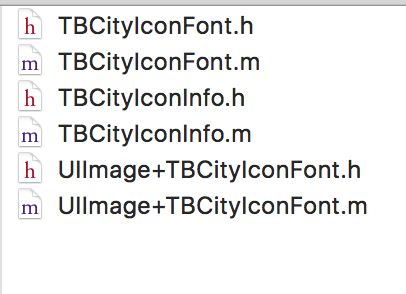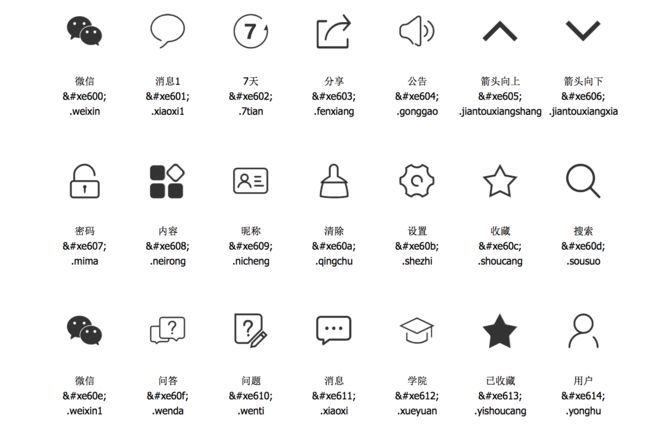在iOS开发中使用iconfont图标
在开发iOS项目时,不可避免的会用到图标,而为了适配不同分辨率的设备,我们通常会需要@2x,@3x两套格式的图片,最明显的就是底部tabBar的图标使用。而对于那些有换肤需求的APP来说,还需要多套图来匹配不同的主题。通过切图的方式制作图标,一方面加大了开发者和设计者的工作量,另一方面也会增大APP的体积。而使用iconfont的可以达到以下目的
1.减小应用体积,字体文件比图片要小;
2.图标保真缩放,解决2x/3x乃至将来nx图问题;
3.方便更改图标颜色大小,图片复用。
所以为了给开发者、设计者稍微减少点工作量,给APP“减重,我们可以将iconfont应用到自己的项目中。那么,iconfont是怎么用的呢?iconfont,从字面上就能理解它就是字体,让开发者像使用字体一样使用图标。
由于我是做开发的,所以对于iconfont的制作并不太熟悉,都是设计师做好了图标给我,如果你想学习iconfont的制作的话,可以去阿里巴巴的iconfont平台去看看,上面有比较全的资料。制作好的iconfont图标是一种.ttf格式的字体,如图:
iconfont中的图标是这样的:
而我们需要的是将.ttf格式的文件引入到自己的工程中
接下来我们借助淘点点科技写的一个关于iconfont封装,方便我们使用iconfont。iconfont的封装包括

1.TBCityIconInfo.h的实现
#import 2.TBCityFontImageInfo.m的实现
#import "TBCityIconInfo.h"
@implementation TBCityIconInfo
- (instancetype)initWithText:(NSString *)text size:(NSInteger)size color:(UIColor *)color {
if (self = [super init]) {
self.text = text;
self.size = size;
self.color = color;
}
return self;
}
+ (instancetype)iconInfoWithText:(NSString *)text size:(NSInteger)size color:(UIColor *)color {
return [[TBCityIconInfo alloc] initWithText:text size:size color:color];
}
@end3.TBCityIconFont.h的实现
#import "UIImage+TBCityIconFont.h"
#import "TBCityIconInfo.h"
#define TBCityIconInfoMake(text, imageSize, imageColor) [TBCityIconInfo iconInfoWithText:text size:imageSize color:imageColor]
@interface TBCityIconFont : NSObject
+ (UIFont *)fontWithSize: (CGFloat)size;
+ (void)setFontName:(NSString *)fontName;
@end4.TBCityIconFont.m的实现
#import "TBCityIconFont.h"
#import 5.UIImage+TBCityIconFont.h的实现
#import 6.UIImage+TBCityIconFont.m
#import "UIImage+TBCityIconFont.h"
#import "TBCityIconFont.h"
#import 7.在AppDelegate.m中,初始化我们的iconfont
#import "AppDelegate.h"
#import "TBCityIconFont.h"
#import "ViewController.h"
@interface AppDelegate ()
@end
@implementation AppDelegate
- (BOOL)application:(UIApplication *)application didFinishLaunchingWithOptions:(NSDictionary *)launchOptions {
//iconfont图标
[TBCityIconFont setFontName:@"iconfont"];
UINavigationController *nav = [[UINavigationController alloc] initWithRootViewController:[ViewController new]];
_window.rootViewController = nav;
// Override point for customization after application launch.
return YES;
}
8.在ViewController.m中实现
#import "ViewController.h"
#import "TBCityIconFont.h"
#import "UIImage+TBCityIconFont.h"
@interface ViewController ()
@end
@implementation ViewController
- (void)viewDidLoad {
[super viewDidLoad];
self.view.backgroundColor = [UIColor whiteColor];
self.navigationController.navigationBar.translucent = NO;
UIBarButtonItem *leftBarButton = [[UIBarButtonItem alloc] initWithImage:[ UIImage iconWithInfo:TBCityIconInfoMake(@"\U0000e602",22,[UIColor colorWithRed:0.55 green:0.55 blue:0.55 alpha:1])] style:UIBarButtonItemStylePlain target:self action:@selector(leftButtonAction)];
self.navigationItem.leftBarButtonItem = leftBarButton;
self.navigationItem.leftBarButtonItem.tintColor = [UIColor colorWithRed:0.55 green:0.55 blue:0.55 alpha:1];
self.navigationItem.rightBarButtonItem = [[UIBarButtonItem alloc] initWithImage:[UIImage iconWithInfo:TBCityIconInfoMake(@"\U0000e60d",25, [UIColor colorWithRed:0.14 green:0.61 blue:0.83 alpha:1.00])] style:UIBarButtonItemStylePlain target:self action:@selector(rightButtonAction)];
self.navigationItem.rightBarButtonItem.tintColor = [UIColor colorWithRed:0.14 green:0.61 blue:0.83 alpha:1.00];
// Do any additional setup after loading the view, typically from a nib.
}
-(void)loadView{
[super loadView];
// imageView
UIImageView *imageView = [[UIImageView alloc] initWithFrame:CGRectMake(100, 50, 30, 30)];
[self.view addSubview:imageView];
//图标编码是,需要转成\U0000e603
imageView.image = [UIImage iconWithInfo:TBCityIconInfoMake(@"\U0000e603", 30, [UIColor redColor])];
// button
UIButton *button = [UIButton buttonWithType:UIButtonTypeSystem];
button.frame = CGRectMake(100, 100, 40, 40);
[self.view addSubview:button];
[button setImage:[UIImage iconWithInfo:TBCityIconInfoMake(@"\U0000e60c", 40, [UIColor redColor])] forState:UIControlStateNormal];
// label,label可以将文字与图标结合一起,直接用label的text属性将图标显示出来
UILabel *label = [[UILabel alloc] initWithFrame:CGRectMake(50, 160, 280, 40)];
[self.view addSubview:label];
label.font = [UIFont fontWithName:@"iconfont" size:15];//设置label的字体
label.text = @"这是用label显示的iconfont \U0000e60c";
}
-(void)leftButtonAction{
}
-(void)rightButtonAction{
}9.运行得到的结果如图:
这样,我们就可以很方便的使用iconfont图标了。这里要注意的是,图标是用的iconfont中的图标用的是unicode编码,我们在自己的工程中时需要将&#xXXXX格式转换成\UXXXXXXXX格式。


